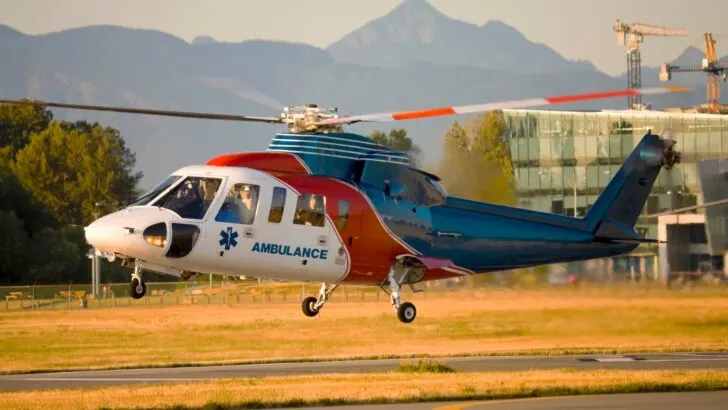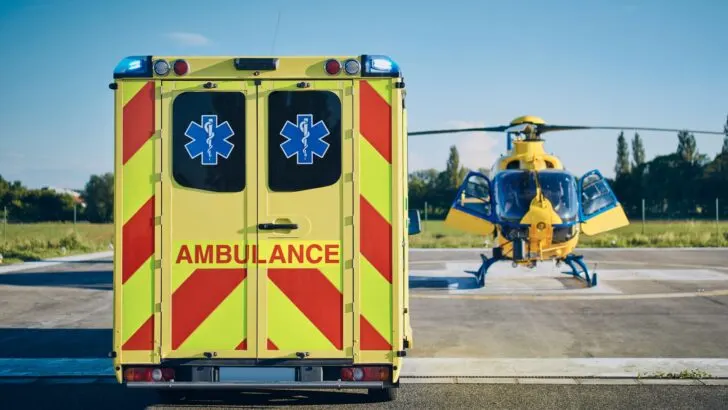For business or pleasure, many of us travel both domestically and to distant corners of the globe. Like most travelers, we enjoy the adventure and everything else about our traveling experiences, but we also know that travel involves certain risks. Medical evacuation insurance can be your lifeline if you have a serious medical emergency when you’re traveling.
Whether your favorite means of travel is RVing, flying, hiking, biking, or cruising the wide open seas, medical evacuation insurance is well worth considering.
- 1) What is Medical Evacuation Insurance?
- 2) Key Benefits of Medical Evacuation Insurance
- 3) Who Needs Medical Evacuation Insurance?
- 4) Do I Need Medical Evacuation Insurance If I Already Have Travel Insurance?
- 5) How to Choose the Right Medical Evacuation Insurance Plan
- 6) Who Offers Medical Evacuation Insurance?
- 7) Free RVing Tips, Tricks, Reviews & Giveaways
What is Medical Evacuation Insurance?
Emergency medical evacuation insurance, sometimes referred to as “medevac” insurance, is a specific type of travel insurance. In the event of a serious medical emergency, it covers the cost of medical evacuation and repatriation (the return of a person to their home country).
Medical evacuation and repatriation insurance provides coverage in situations where a traveler faces a medical condition of such severity that it requires evacuation to a suitable medical facility or, in some cases, repatriation to their home country for treatment.
While your health insurance may cover medical transport when you’re traveling domestically, travel insurance to cover medical evacuations when you’re outside of the country can be life-saving.
In addition to medical issues, there are also security risks when traveling to certain countries, which is why some policies offer emergency evacuation coverage for travel to dangerous areas.
While you may be aware of the covered medical expenses under your health insurance plan, emergency medical transport from foreign countries or even domestically may not include coverage for emergency medical evacuation to a facility that can treat your illness or injury.
Some insurance policies cover medically reasonable transports domestically, but general health insurance policies may not cover air ambulance services.

In the event of serious injury or grave illness when traveling abroad, it’s important to have coverage for the services necessary to get you to the closest trauma center or repatriated to your home country for treatment.
For this reason, no matter where you intend to travel, it’s essential to know exactly what your general health insurance policy covers and what additional coverage you may need in terms of a travel policy. The fine print is important here, as some policies cover air medic transport only with a letter of medical necessity from an emergency physician.
Note that some health insurance plans, roadside assistance plans, and even travel groups like FMCA, may provide some level of evacuation assistance. But is it enough or do you need additional coverage?
We’ve traveled to foreign countries to RV in them five different times (so far). Several of our friends have done the same, often traveling with us.
If you or your traveling companion(s) should become seriously ill or injured while you’re in a foreign country and medical facilities in that country aren’t equipped to save your life, medical evacuation insurance can be crucial. Otherwise, you may not be transported to an appropriate trauma center or repatriated back home for the health care you need.
We know two specific instances where this happened. Dear friends of ours were wintering in the Quartzsite, AZ desert. When one of them became ill, they headed to the closest hospital in Parker, AZ. Staff there knew that her condition was too serious for them to handle, and she was quickly flown by helicopter to Phoenix.
After being diagnosed with a brain abscess (and being successfully treated during a weeks-long hospital stay), doctors told her that if she’d arrived two hours later, she wouldn’t have survived.
Another friend’s cousin was gravely injured while traveling in the Bahamas. He would have died had he not been medically evacuated to Florida (with a full medical team on board) for intensive treatment.
So, whether you travel domestically or abroad, it can be incredibly important to have medevac insurance so that in the case of extraordinary illness, injury, or even a natural disaster, you can be moved to a hospital that’s equipped with a trauma center or has the ability to treat your particular illness.
Key Benefits of Medical Evacuation Insurance
Let’s look at the main benefits of medical evacuation insurance.
Emergency Medical Evacuation
Emergency medical evacuation insurance covers the substantial costs associated with evacuating a traveler from a remote or underserved location to a medical facility capable of providing adequate care. This may include air ambulance services, ground transportation, the coordination of the evacuation itself, and, in some cases, the cost of your traveling companion staying with you the entire time.
Repatriation
Medically necessary repatriation (back to your home country for care) can be an important benefit of medical evacuation insurance. If you become gravely ill or are injured in an area where the emergency medical team deems repatriation necessary to save your life, your medevac insurance could cover repatriation.
Additionally, in the unfortunate event of a traveler’s death while abroad, this insurance can also cover the costs of repatriating the remains to their home country, easing the emotional and financial burden on the family.

In some cases, a ground ambulance may need to transport a patient to a medevac helicopter, so both forms of emergency transportation are employed. It’s important to have sufficient coverage for any type of emergency transportation that may be necessary.
Access to Specialized Care
If a traveler requires specialized medical treatment that is not available locally, medical evacuation insurance can ensure transportation to a facility where they can receive the necessary care from appropriately qualified healthcare professionals.
Coordination Assistance
Medical evacuation insurance often includes around-the-clock emergency assistance services. These services can help travelers navigate the complex logistics of a medical emergency, including language barriers, local regulations, and coordination of medical and transport services.
Who Needs Medical Evacuation Insurance?
Medical evacuation insurance may be important for all travelers, but it’s particularly relevant for travelers who fit into certain categories.
Frequent Travelers
Anyone who travels frequently for business or pleasure, especially internationally or to remote or less developed regions, should consider medical evacuation coverage.
Adventurous Travelers
Travelers who engage in adventurous activities such as hiking, climbing, mountain biking, or extreme sports should consider medical evacuation insurance due to potential accidents that can cause serious injury.
While bungy jumping probably isn’t very high-risk, we were certainly more comfortable having it when we threw ourselves into a gorge in New Zealand!
Many people consider medical evacuation insurance only if they’re traveling outside of their home country, which is understandable. However, if you’re traveling within the U.S. and you’re taking any sort of adventure-oriented trip (particularly in a remote area), it’s still wise to have evacuation coverage.
Should you be injured, your regular health insurance plan may cover your transportation to a hospital and your medical care. But it’s unlikely to cover a flight home requiring medical equipment and the care of medical escorts. You’d also be responsible for any copays and deductibles that are part of your health insurance coverage.
Senior Travelers
Travelers who are older, particularly those with pre-existing medical conditions, may be more vulnerable to medical issues. These travelers may find medical evacuation insurance to be a wise choice for added security.
Senior travelers from the United States need to be aware that Medicare isn’t accepted abroad.

Senior citizens are among the travelers who may be most interested in buying medical evacuation insurance and other types of elevated medical coverage.
Families
Families traveling with young children may find peace of mind in knowing that they’re all covered in case of a medical emergency.
Do I Need Medical Evacuation Insurance If I Already Have Travel Insurance?
If you’re a US citizen traveling outside the United States, it may be essential that you have travel medical expense insurance because your domestic health insurance plan may not provide international coverage. Be sure to check with your health insurance company prior to traveling to see if your plan has global coverage or whether it’s considered “out of network.”
However, general travel insurance and travel medical expense insurance are different from medical evacuation insurance.
Depending on the type(s) of insurance you already have, it may be important to have both medical evacuation travel insurance and general travel medical insurance, particularly if you’re traveling abroad.
The best way to answer this question is to carefully check the specific coverage of any travel insurance policy you already have, and fill in any gaps in coverage with policies offering any additional coverage you want while you’re traveling.
How to Choose the Right Medical Evacuation Insurance Plan
When selecting medical evacuation insurance, you’ll want to consider the following factors:
Coverage Limits
Carefully review the coverage limits to ensure they meet your specific needs, especially if you’re traveling to areas with high medical costs. Be sure to pay close attention to the medical and evacuation limits of any emergency travel insurance plan you’re considering.
Geographic Coverage
Make sure the policy you’re considering covers the specific countries or regions you plan to visit.
Exclusions
Carefully check the language in any policy you’re considering to make sure there are no pre-existing condition or other exclusions. Make sure you clearly understand what is and is not covered under the policy.
Emergency Assistance Services
Evaluate the quality and availability of round-the-clock (24/7) emergency assistance services, as these can be crucial in managing a medical crisis.
Hospital of Choice
Most medical evacuation insurance plans state somewhere (possibly in the fine print) that you’ll be flown to the nearest adequate facility for treatment. Some plans offer add-on coverage so that once you’re stabilized you can choose to be transferred to the hospital of your choice for additional care.
So, if you want to have the ability to be transferred to the hospital of your choice for further care once you’re medically stabilized, you’ll want to be sure to purchase a plan that offers that benefit. Note that these don’t usually apply to rehabilitation centers or nursing homes.
Consult with your insurance agent and ask specifically if “hospital of choice” coverage is offered, how it works, and what the cost is.
Extreme Sports Exclusions
There are some travel insurance plans that exclude medical and evacuation benefits for injuries that result from extreme sports or adventure activities. Sometimes you can request a rider to obtain this coverage, or you can find a plan that doesn’t exclude extreme sports or activities.
But, depending on what you’ll be doing when you travel, you’ll want to make sure your activities aren’t triggering an exclusion on the policy you buy.

If you intend to participate in any type of extreme sports or high-risk adventures, be sure these types of activities are not excluded from any travel insurance policy you’re considering.
Cost
As always, the cost of any insurance plan should be considered. Compare the cost of the insurance policy against the potential expenses of an emergency evacuation. The peace of mind offered by medical travel insurance often justifies the expense, depending on the cost of the policy, where you’re traveling, and what other coverage you have.
Who Offers Medical Evacuation Insurance?
Many insurance companies offer medical evacuation insurance plans. However, all plans are different and it’s important to understand exactly the coverage each company provides. Here’s a sample of some companies travelers commonly look to for medevac insurance:
FMCA (FMCAssist)
If you’re an RVer and you’re a member of FMCA (Family Motor Coach Association), you’ll automatically have FMCAssist coverage. FMCAssist provides RV travel medical evacuation insurance (including repatriation coverage) to all FMCA members. This is a great deal for those who travel by RV.
With FMCAssist, you’ll be covered whenever you’re more than 75 miles from home. (Full-time RVers are always considered to be 75 miles from home.)
It’s important to note that FMCAssist services are provided to FMCA members traveling abroad, though there are some exclusions and limitations. Depending on how and where you travel, you’ll want to take a close look at the details in FMCAssist coverage.
As part of the FMCAssist program, the following services are provided to FMCA members:
- Medical Evacuation and Repatriation
- Return Home
- Family Travel Expense
- Return of Mortal Remains
- Return of Dependent Children
- Recreational Vehicle/RV Return (limited to trips in North America only)
- Return of Private Passenger Automobile (limited to trips in North America only)
- Pet Return
- Prescription Medication and Glasses Replacement
- Accidental Death and Dismemberment Benefits
- Emergency Cash and Emergency Room Cash Benefits
With an FMCA membership, you’re also receiving a wide variety of other benefits in addition to FMCAssist, so this is a program that RVers may want to strongly consider. You’ll find a full list of benefits to FMCA membership on their website.
Good Sam (TravelAssist)
Also good for RVers as well as for those who travel by air or by ship are the TravelAssist plans from Good Sam.
The TravelAssist plans can include coverage for individuals, couples, or families, and they even have a plan that includes extended family and pets.
In general, in the event of a medical emergency when you’re traveling, your TravelAssist plan would cover the coordination of appropriate medical attention as well as any return services you may need, regardless of your mode of travel.
These plans reduce or eliminate the out-of-pocket costs associated with certain medical services, and arrange to get you, your vehicle, and your family home.
Some of the features of the TravelAssist plans include:
- RV & vehicle return if you’re unable to drive
- Emergency medical transportation to get you to a facility that is able to care for you
- Ground ambulance service
- Flights home after an emergency for you, your children, and your spouse / traveling companion
- Return of deceased remains
- Coverage available for pets
- Coverage available for extended family
Medjet
Medjet is a bit different from a traditional insurance plan. Medjet is a medical transport membership program that provides elevated coverage and gives you control over where you’re treated.
Under Medjet’s membership program, if you’re hospitalized more than 150 miles from home domestically or internationally, bedside-to-bedside air medical transport and medical repatriation to the home country hospital of your choice will be arranged by Medjet.
You won’t need to file a claim and there are no transport cost maximums. You simply pay a membership fee and you’re covered. There’s also no application process if you’re under the age of 75, and there are no adventure travel or pre-existing condition exclusions.
SkyMed
Skymed offers emergency travel services to people traveling in the USA, Canada, Mexico, the Caribbean, Bermuda, and the Bahamas. They offer short-term, annual, and expat plans.
SkyMed covers medical evacuation and repatriation, ambulance and helicopter services, and return of vehicles, RV, vessel, or motorcycle, and takes you to the hospital of your choice.
Other Companies Offering Medical Evacuation Insurance
Many insurance companies offer travel insurance, and many of these offer medical evacuation coverage. Some companies/plans that are well-rated include the following:
- AXA Assistance USA
- Allianz Travel Insurance
- Cat 70
- SquareMouth Medical Evacuation & Repatriation Plan
Again, you need to carefully check the coverage of any insurance plan you’re considering to make absolutely sure that you’re buying coverage that’s right for your needs.
Carefully consider what you want in the event of a medical emergency and what you’re comfortable paying. No one likes to think about this sort of thing, and nobody wants to need it. But having specialized insurance when you’re traveling can pay off in a big way… including saving your life.
Free RVing Tips, Tricks, Reviews & Giveaways
As 20-year full-timers, we share everything we’ve learned about RVing over the years. Join our online community to receive a wealth of great RVing knowledge delivered daily to your inbox.
Whether you’re a new RVer or a seasoned full-timer, you’ll love the wide range of RVing topics we cover. Don’t miss a single article or any of our famous Giveaways. Subscribe to our newsletter today!


Chuck Smith
Monday 2nd of October 2023
Another one is MASA (Medical Air Service Association). It has worldwide coverage. https://www.masamts.com
Al Bartkowski
Monday 2nd of October 2023
I snowmobile (2,500mi trips) in very northern Quebec and Labrador Canada. I can go for sometimes a day or two without ANY cell phone coverage. There is NO 911 to call!!!!! You are on your own!!! Even with a satellite phone- NO 911!!! I belong to a service called "AirMedic Quebec" who will transport you back to a hospital. IF, you don't belong, it can be $7-$8,000+. on your credit card depending if they need a chopper to get to you. For the winter season I pay under $200.00 depending on the plan. WELL worth it!!!